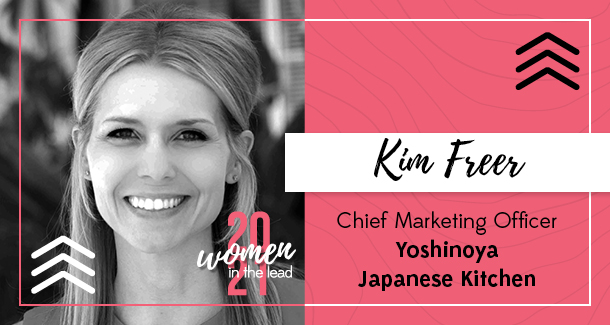Staffing
4 leading QSR women discuss how things are, how they want them to be
Female leaders across quick-service today know they owe a lot to their predecessors for the positions they've attained today. But that doesn't mean they're resting on their laurels. As you'll learn from the cadre of women recently interviewed for International Women's Day, there's still plenty of work to be done.
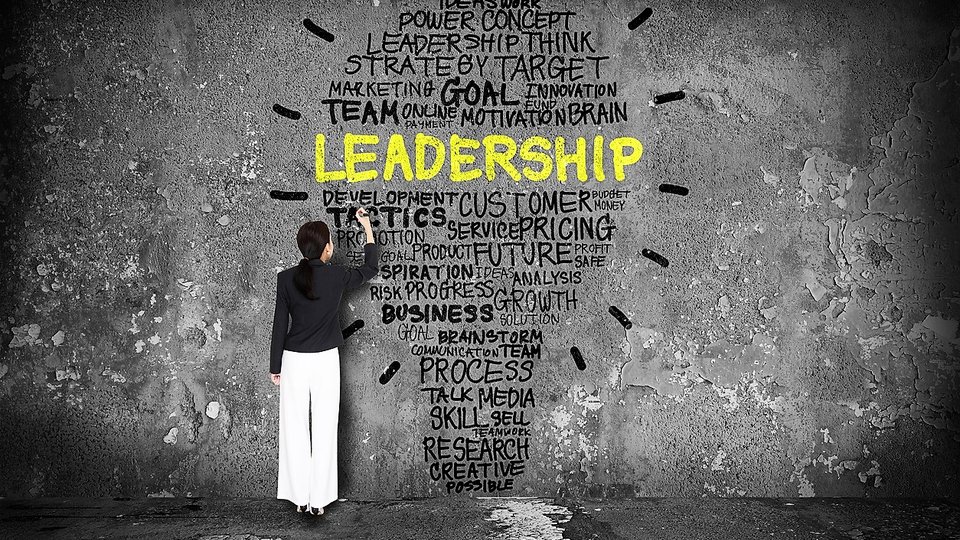
March 9, 2021
Yes, as a woman in the restaurant business today, you absolutely must talk up your achievements. And no, sadly, female-to-female backstabbing is not totally a thing of the past, but it is getting much better. In fact, progress is being made on every front for women who wish to rise through the ranks in the quick-service restaurant industry.
Those are just some of things female QSR leaders told us in interviews for our annual International Women's Day coverage. Fast Casual Editor Cherryh Cansler talked to more than women working in high-level positions across limited-service, including four standouts from the quick-service sector. And while you can read all the interviews in her extended stories, in two parts, here we're shining the light on the four women profiled within the quick-service industry exclusively, as listed below in alphabetical order by brand.
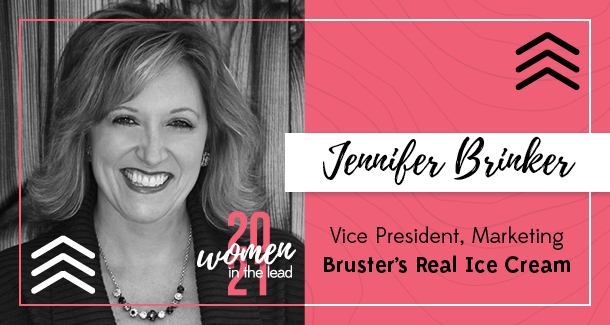
Bruster's Real Ice Cream Vice President of Marketing Jennifer Brinker
Q. How did you get your start in the restaurant business?
A. My background is actually in franchise marketing … which is what led me to Bruster's. As a key player in the growth of GNC, a franchise retailer, for well over a decade, I effectively developed and led high-performing teams that grew the customer base and revenue while also building brand equity. This experience translated well into my role at Bruster's — when I joined more than five years ago to help build the brand to reach growth goals. Alongside our leadership team, we've continued to build a successful brand that is in the midst of seven consecutive years of same-store sales increases, with cumulative growth at 49.5%, and are on pace to open 20 new locations this year.
Q. Do you believe — as many female leaders have stated — that often women impede the progress of other women's advancement? How do you personally address that in your life?
A. At Bruster's we focus on creating a space for employees to be successful by delivering on our values. Women play a key role in our success across all areas of the business from marketing and franchise development to operations, store owners, managers, certified ice cream-makers and scoopers. We're committed to promoting teamwork, motivation and collaborative idea generation while also helping the business and its franchisees to attain growth goals.
Q. Can you discuss a time when you were underestimated or discriminated against because of your gender? What did you do? What did you learn from that incident?
A. My career achievements have been based on my own professional merits and supported by leaders, colleagues and friends. Based on that career experience, and as a senior leader, I am cognizant of sustaining an inclusive team atmosphere in which our Marketing group can feel supported and empowered to achieve goals.
Q. How do you ensure that your voice is heard and/or that you receive credit and compensation for your contributions?
A. I am blessed to work for a company that is led by trailblazers, like CEO Jim Sahene, who recognize my contributions as well as fully support the endeavors of both myself and my team.
Q. If you have a daughter (and especially if you have a son) what do you want them to take away from your career position about the value of female leaders?
A. As a mother of a teenage daughter graduating high school this year and a son, who is a junior in college, I want them to take away the importance of finding inner happiness on their career journeys. I encourage them to find something that fulfills, empowers, and challenges them while also remaining authentic, proactive and being active listeners. I believe these characteristics will help them to become great leaders that are strong communicators and exude confidence to inspire future colleagues and teams to do great things.
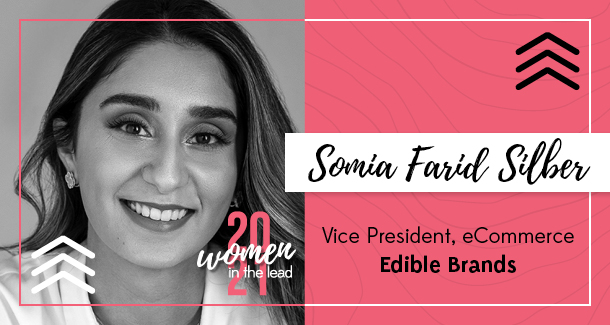
Edible Brand Vice President of eCommerce Somia Farid Silber
Q. How did you get your start in the restaurant business?
A. My dad, Tariq Farid, opened the first Edible Arrangements store when I was 6 years old. I worked in our stores for most of my childhood and teen years. During college, I spent summers interning with various departments and joined full time in June 2016.
Q. Do you believe — as many female leaders have stated — that often women impede the progress of other women's advancement? How do you personally address that in your life?
A. I feel like progress is often impeded by corporate dynamics that are typically male-dominated, rather than by women. Women need to rally together and support each other's growth especially in male-dominated industries and workplaces. I am fortunate enough to have a strong network of supportive mentors, most of whom are women. One of the most important things I've learned from my mentors and other women in business and tech is that I have to focus on myself and my own professional growth. Constantly comparing myself to others is not going to help my success, but rather will potentially hold me back. You have to remember to focus on yourself and to not lose your confidence.
Q. Can you discuss a time when you were underestimated or discriminated against because of your gender? What did you do? What did you learn from that incident?
A. At Edible, we're lucky to have an executive team that is 50% women, and I personally have not experienced a lot of discrimination here. However, I have experienced discrimination in other workplaces and settings. The recurring comments that I have received the most from male colleagues are telling me to "smile more," or that I come across as "pushy" for being opinionated and outspoken when it comes to my work. Early in my career, remarks like these used to frustrate me so much because I knew they weren't being made to my male counterparts.
My way of dealing with it was to just ignore it. Now, I've found that comments like these actually just create within me an even stronger urge to do more and to do even better to make sure women have a seat at the table and get credit where credit is due.
Q. How do you ensure that your voice is heard and/or that you receive credit and compensation for your contributions?
A. As mentioned before, it's very important to me. However, if you have a seat at the table, you need to actively participate rather than sitting there quietly. If you partake in something valuable, you have to make sure you are recognized for it. People who care about you succeeding may not always be around. For the women around me, I make sure they receive the recognition they deserve. I used to be very shy and would not speak up even when I had a great idea or comment. One piece of advice that I got from a friend early in my career is that I should remember that the worst thing a manager or leader can say is "No" or "You're not ready," and we cannot let fear of this rejection keep us from making an impact. Now, if I ever hear, "No," I take some time to think about why my idea was rejected — if it was my delivery, if I didn't have enough supporting data, etc. "No" actually encourages me to figure out how to make it a "Yes" in the future.
Q. If you have a daughter (and especially if you have a son) what do you want them to take away from your career position about the value of female leaders?
A. I don't have any children, but if I did, I would teach them the importance of diversity and empathy. We need to get to the point where we're not talking about "female leaders" but just "leaders." At the end of the day, it shouldn't matter when women are in executive positions, and I look forward to the day when this is normalized. For now, I will focus on teaching my younger siblings, cousins and future children the value of empathy and diversity. Both empathy and diversity in leadership are keys to showing your value as a leader, and it will allow for all different perspectives.
Women are often told that they are too emotional for leadership roles, but sometimes emotion is needed. I'm not an outwardly emotional person, but I know when I need to be. Another reason why diversity is so key for leadership teams is because you want the people running a brand to truly represent their customer base and their needs. I truly believe a team with these qualities can make magic happen!
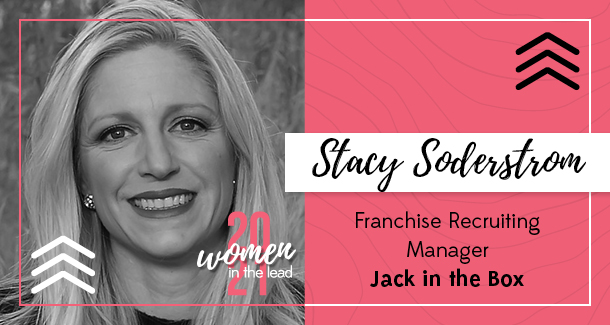
Jack in the Box Franchise Recruiting Manager Stacy Soderstrom
Q. How did you get your start in the restaurant business?
A. Early on in my career, I stumbled into the industry. I was working as a Sales Representative for Xerox right out of college and one day I was visiting a client to check up on their printing needs. I accidently patched through to the wrong floor, which just so happened to be the corporate office of Quiznos Sub. I found out they were hiring for an entry-level sales position, I applied and got the job. I've learned so much about the restaurant and franchising industry and have worked my way up over the past 17 years with roles at leading concepts including KFC, Dog Haus, and now am proud to be part of the Jack in the Box family.
Q. Do you believe — as many female leaders have stated — that often women impede the progress of other women's advancement? How do you personally address that in your life?
A. Unfortunately, yes. I've seen this happen all too often in my career, especially early on. There is a shift happening in our industry, women celebrating other women's career milestones. I have made a conscious decision to align myself with brands that have a culture that embraces diversity and inclusion, and that is one of the many reasons I joined Jack in the Box. Throughout my career I've worked for strong, supportive, amazing women at organizations that encouraged my growth in the field. I personally strive to return the same mentorship I received over the last decade. When I work or engage with younger women just starting out, I look for ways to support their onboarding, and open myself up as a resource to answer any questions they have or provide guidance that will benefit their professional development. I believe strong and successful women want to help others and we are seeing positive results in our field.
Q. Can you discuss a time when you were underestimated or discriminated against because of your gender? What did you do? What did you learn from that incident?
A. I would say there are a few I can recall, one has stuck with me over time. This instance was a prospective franchisee interested in becoming an operator. As I sat down with the candidate, he made it perfectly clear he did not want to work with a woman, despite my qualifications or ability to properly assist. My experiences early on helped me determine the ways to ensure my value in these conversations is heard. Sometimes women are devalued or discriminated against, but I've learned that by having an open conversation about the issue, we can find a mutual way to resolve it. In the past I've seen first-hand how women aren't always taken as seriously as they should, and I've also seen first-hand how the industry has evolved over the past decade in a positive way. While there's still room to grow, there are women currently in leadership roles empowering us to make greater contributions to our organizations and the industry.
Q. How do you ensure that your voice is heard and/or that you receive credit and compensation for your contributions?
A.Personally, when it comes to credit and compensation, I will lean in on my experiences. I focus on being the right fit, highlight my expertise, the contributions I've made at other brands, and why I am the most qualified for the role. When it comes to compensation, I investigate the pay range for the particular role and determine where my experience puts me on the scale. I believe that no matter where a person identifies in their gender male or female, they should be respected equally if able to do the job well and to the same degree.
Q. If you have a daughter (and especially if you have a son) what do you want them to take away from your career position about the value of female leaders?
A.I have a daughter and a son. My biggest takeaway from my career as I raise both of my children, instilling confidence, inclusion, and respect. If they believe they can do something, they should go for it. I want my daughter to see that if she works hard and has determination to succeed, she will. I strive not to let the opinions of others deter me from reaching my goals and it is my hope that she does the same, and that she will always go after what makes her happy. I make it a priority to balance work and family, and through my example I hope she sees that she can be a wonderful mom while also leading a successful career.
Yoshinoya Japanese Kitchen CMO Kim Freer
Q. How did you get your start in the restaurant business?
A. I was hired by an advertising agency to work on the Subway sandwiches account and have been enamored with the restaurant industry ever since. I found the fast pace, changing menu items and the immediate guest feedback energizing. At the same time, food inherently brings us together. It gives us an opportunity to not only share a meal, but also share ideas. I love working in a field that feeds our body and our soul, allowing us to connect and build relationships.
Q. Do you believe — as many female leaders have stated — that often women impede the progress of other women's advancement? How do you personally address that in your life?
A.Because there are so few women in leadership positions, particularly in the restaurant industry, some believe there's only room for one female to rise to the top, creating a competitive environment. I, however, believe that instead of looking at each other as adversaries, women should network and cheer each other on. As one female leader climbs the corporate ladder, others will follow and will have a true a role model to look up to, learn from and thrive with.
Q. Can you discuss a time when you were underestimated or discriminated against because of your gender? What did you do? What did you learn from that incident?
A. I had the pleasure of listening to Denyelle Bruno, the CEO of Tender Greens, speak about gender equality. During the discussion, the audience asked how she handles being the only female in a meeting or how she dresses knowing the attendees will be male. Her answer was so perfect. She said she didn't think about it all, because any energy spent on it would simply detract from her focus and preparation. We all have stories to share about times we've been overlooked, underestimated or discriminated against, but the thing that stuck with me from her discussion was to focus on the now. Approach each moment as an opportunity. Be present in meetings. Over prepare. Make your voice heard.
Q. How do you ensure that your voice is heard and/or that you receive credit and compensation for your contributions?
A.You've got to be your own advocate. Have confidence in your abilities. Articulate your point of view. Take credit for your contributions. Stick to your guns. Make each moment count.
